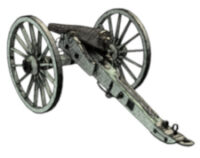Sunday, July 21.-Battle of Manassas Plains. This battle will always occupy a prominent place in the memory of every man of the battery. They all expected to ?nd a disorganized mob, that would disperse at our mere appearance; while, to the general surprise, they not only were better disciplined, but also better of?cered than our troops. We started by two o’clock in the morning, but proceeded very slowly. Passed Centreville before break-of-day. When the sun rose in all its glory, illuminating the splendid scenery of the Blue Ridge mountains, though no sun of Austerlitz to us, we crossed the bridge over the Cub Run. By this time, the report of the 30-pounder Parrott gun belonging to Schenck’s command, who had met the enemy, was heard. Our division turned off to the right, and marched some miles through dense woodland, to the Warrenton road. Towards ten o’clock, nothing could be seen of the enemy yet, and the belief found circulation that the enemy had fallen back. Experience proved that, had we remained at Centreville, the rebel army would undoubtedly have attacked us; but hearing of our advance they only had to lay in ambush, ready to receive us. At the aforesaid time, the Second Rhode Island infantry deployed as skirmishers. We advanced steadily, till arriving at the Bull Run and Sudley’s church, a halt was ordered to rest the men and the horses. But it should not be; the brave Second R. I. Regiment, coming up to the enemy, who was concealed in the woods, their situation was getting critical. The report of cannon and musketry followed in rapid succession. Our battery, after passing Sudley’s church, commenced to trot in great haste to the place of combat. At this moment Gen. McDowell rode up in great excitement, shouting to Capt. Reynolds: “Forward with your light battery.” This was entirely needless, as we were going at high speed, for all were anxious to come to the rescue of our Second regiment. In quick time we arrived in the open space where the con?ict was raging already in its greatest fury. The guns were unlimbered, with or without command; no matter, it was done, and never did better music sound to the ears of the Second Regiment, than the quick reports of our guns, driving back the advancing foe. For nearly forty minutes our battery and the Second Regiment, defended that ground before any other troops were brought into action. Then the First Rhode Island, Seventy-?rst New York, and Second New Hampshire, with two Dahlgren howitzers, appeared, forming on the right and left. The enemy was driven successfully in our immediate front. Our battery opened on one of the enemy’s light batteries to our right, which left after a short but spirited engagement, in a rather demoralized state. Grif?th’s, Ayer’s and Rickett’s batteries coming up, prospects really looked promising, and victory seemed certain. The rebel line gradually giving way. Gen. McDowell, seeing the explosion of perhaps a magazine or a caisson, raised his cap, shouting, “Soldiers, this is the great explosion of Manassas,” and seemed to be highly pleased with the work done by our battery. Owing to different orders, the battery, towards afternoon, was split into sections. Capt. Reynolds, with Lieuts. Tompkins and Weeden, off to the right, while the two pieces of the left section, to the left; Lieuts. Vaughan and Munroe remaining with the last mentioned. Firing was kept up incessantly, until the arrival of confederate reinforcements, coming down from Manassas Junction, unfurling the stars and stripes, whereby our of?cers were deceived to such a degree as to give the order, “Cease ?ring.” This cessation of our artillery ?re proved, no doubt, disastrous. It was the turning point of the battle. Our lines began to waver after receiving the volleys of the disguised columns. The setting sun found the fragments of our army not only in full retreat but in a complete rout, leaving most of the artillery in the hands of the enemy. Our battery happened to be the only six gun volunteer battery, carrying all the guns off the battle-?eld, two pieces in a disabled condition. A battery-wagon and forge were lost on the ?eld. Retreating the same road we advanced on in the morning. All of a sudden the cry arose, “The Black Horse Cavalry is coming.” The alarm proved to be false; yet it had the effect upon many soldiers to throw away their arms. But the fears of many soldiers that the “enemy would try to cut off our retreat, were partly realized. Our column having reached Cub Run bridge, was at once furiously attacked on our right by artillery and cavalry. Unfortunately, the bridge being blocked up, the confusion increased. All discipline was gone. Here our battery was lost, all but one gun, that of the second detachment, which was carried through the creek. (It is kept at the armory of the Marine Artillery, in Providence. At the present time, guns, under such circumstances, would not be left to the enemy without the most strenuous efforts being made to save them.) We assembled at the very same camp we left in the morning. Credit is due to Capt. Reynolds, for doing everything possible for the comfort of his men. At midnight the defeated army took up its retreat towards Washington. Our battery consisting of one gun, and the six-horse team, drove by Samuel Warden.
Manassas Plains

• • • • • • • • • • • • • • • • • • • • • • • • • • • • • • • • •